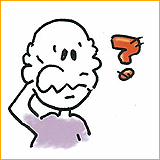| Mental Health Tips | |
| Common Mental Problems | |
| Substance Misuse | |
| Treatment of Mental Disorders | |
| Mental Health Education Pamphlets | |
 Dementia
Dementia
(Special thanks to Dr. Mimi Wong of Institute of Mental Health, Castle Peak Hospital, for authoring this article)
Many of us become more forgetful as we get older. Some of us will begin to develop more serious memory problems which affect their ability to cope with daily living. These may be the first signs of dementia. We are going to discuss about the common causes of memory problems in elderly and how to seek help when a memory problem occurs.
1. What is dementia?
2. What is mild cognitive impairment?
3. What are the causes of dementia?
4. What are the symptoms of dementia?
5. How to investigate and make diagnosis for dementia?
6. How should dementia be managed?
7. How to prevent dementia?
1. What is dementia?
It is a common belief that memory deterioration is normal as we grow older and there is nothing that we can do about it. However, we have to note that normal age related memory deterioration does not interfere with our ability to cope with daily living. You need to be alert if you notice that any elderly person around you becomes unable to go out or prepare meals on his own, or to take care of himself due to his memory deterioration. That elderly person may be suffering from dementia. Dementia is a brain disease which often starts with memory problems, but goes on to affect many other parts of the brain, producing problems like communication difficulties, changes in mood or personality.
Dementia usually gets worse over time. With dementia, you tend to rely on other people more and more as the illness progresses. It is much more common in older people, but can start as early as 40. About 1 in every 20 over-65s has dementia and by the age of 80 about 1 in 5 will have it. It is therefore very important to seek professional help if you suspect that someone has symptoms of dementia.
2. What is mild cognitive impairment?
Mild cognitive impairment refers to the condition that memory problem is more than you would expect for your age but not severe enough to interfere with daily living. In this stage, the ability to cope with daily living is still preserved, but there have already been some noticeable decline in memory, language, or another mental function. 60% of patients with mild cognitive impairment will progress to dementia within their lifetime, with 20% happening within the first eighteen months. However, we can't yet predict who these people will be.
3. What are the causes of dementia?
There are many causes for dementia and among these causes, there are four which are more important.
- Alzheimer’s disease is the commonest cause. Abnormal tissue builds up in the brain, and they appeared as deposits which are called ‘plaques’ and ‘tangles’. These deposits make the brain cells around them to degenerate, resulting in disruption in the transmission of some chemicals (for example, acetylcholine) among brain cells.. The disease progress comes on gradually and develops slowly over several years. It can sometimes run in families.
- Vascular dementia - the arteries supplying blood to the brain become blocked. This leads to small strokes - parts of the brain die as they lack oxygen supply. It is more common in smokers or those with high blood pressure, diabetes or high cholesterol.
It is difficult to predict how fast it will deteriorate. It can be stable for several months or years but then, when more strokes happen, there will be further deterioration.
The problems caused by vascular dementia will depend on which part of the brain is affected. There may be memory loss, poor concentration, word finding difficulties, mood swings or depression. Some people have hallucinations (where they see or hear something that is not there).
- Lewy body dementia - People with Lewy body dementia have symptoms which overlap with Alzheimer’s disease and Parkinson’s disease. The level of confusion can fluctuate during the course of the day. There can also be visual hallucinations, e.g. seeing images of people or animals. They may also have tremor, muscle stiffness, falls or difficulty with walking.
- Fronto-temporal dementia – if the dementia affects the front of the brain more than other areas, it is more likely to cause personality changes e.g. the patient may become irritable or sexually disinhibited.
Memory problem is not obvious. It is important for carers to understand that the change is related to the underlying illness rather than the patient’s own will.
Other causes of dementia: Many other illnesses can cause memory problems. Depression can cause a 'pseudo-dementia' which can get better with antidepressants and psychological treatment. Physical illnesses which cause memory problems include:
- kidney, liver or thyroid problems;
- shortage of some vitamins (rare);
- chest or urine infections can lead to confusion which is short-lasting, and subsides after the infection is treated.
4. What are the symptoms of dementia?
The symptoms include cognitive symptoms and behavioural and psychological symptoms.
- 1) Cognitive symptoms
- Memory problem:When the patient is away from environment familiar to him, he will lost his way easily. He will forget about the time, date, month or year or even his own address or where he is located. He will lost his personal belongings frequently and sometimes may suspect that others have stolen his properties. He will repeatedly say the same thing as he has forgotten what he just said and he will complain that his carer starve him deliberately as he has forgotten the food he just taken. When the condition becomes worse, he cannot find his way even in familiar environment like his home. The saddest thing is that he will not be able to recognise his beloved ones in the advance stage of the illness.)
- Difficulty finding the correct words to express himself. When the condition becomes worse, his speech will be incomprehensible and he cannot understand what other people are saying.
- Lost his abilities learnt previously, e.g. how to put on his clothes or use eating utensils.
- Lost his intelligence, judgment and reasoning (e.g. thought that his son is the same age as he is; put his purse in the refrigerator.)
- Personality change: became irritable, withdrawn, rude, bored and lost interest in things.
- Suspicious and may even develop into persecutory delusions
- Anxious and depressed
- Abnormal behaviour, e.g. refuses to change clothing, wandering around, incontinence and becomes aggressive
- Experience hallucination, e.g. able to see many children in his home whom others cannot see
2) Behavioural and psychological symptoms
These are very common in patients with dementia, over half of them will have certain degree of the symptoms. These also cause a lot of trouble to the carer and this is often the reason why patients with dementia require residential care.
5. How to investigate and make diagnosis for dementia?
If you worry that you have got memory problem, it is important to arrange an appointment with your doctor for proper assessment. Your doctor will perform a simple cognitive assessment as well as physical examination on you and order some blood tests. He will refer you to the appropriate specialist clinic or memory clinic for further memory assessment or imaging of the brain if needed.
6. How should dementia be managed?
There are no cures for most types of dementia. However, there are ways to slow down memory deterioration and to control the behavioural and psychological symptoms in order to reduce carer’s burden.
Management of dementia includes pharmacological treatment and non-pharmacological methods.
- Reminiscence therapy: it involves the discussion of past activities, events and experiences, with another person or group of people, often assisted by aids such as videos, pictures, archives and life story books.
It promotes an older adult's sense of security by reviewing comforting memories and is found to be helpful in improving his functional ability. - Multi-sensory therapy: it takes place in a dedicated room where patients experience a range of unpatterned visual, auditory, olfactory and tactile stimuli. Its aim is to be a relaxing activity, designed to create a feeling of safety where stimulation which is under the user’s control. It promotes relaxation in agitated patients and stimulated unresponsive ones.
- Regular daytime activities can help to prevent day-night reversal in patients with dementia. Day care center can act as respite to relieve the heavy burden of carers.
- Memory aid can reduce the inconvenience associated with memory deterioration, for example, a diary can help you remember appointments and tasks.
- Clear labeling at home can help to enhance orientation in demented patients, e.g. put label outside drawer for easy identification of the contents inside.
- Necklace or bracelets with patient’s address and contact of carer to be worn by patients can facilitate easy identification in case patients get lost.
- It is also important to stop smoking, eat healthily and take exercise to reduce the risk of stroke.
1) Pharmacological treatment
There is a group of drugs called cholinesterase inhibitors which may slow the progression of memory deterioration in Alzheimer’s dementia. It cannot stop the disease process, i.e. unable to stop the destruction of brain cells, but it can slow down the breakdown of acetylcholine, allowing it to continue its function inside the brain. Although it cannot reverse the deterioration in cognitive functioning, it can help to preserve it for a certain period of time. These drugs may also help some psychological symptoms in Lewy Body dementia. When a significant amount of brain cells is being destroyed and there is too little acetylcholine left, the medication will be no longer effective. Therefore it is only suitable for mild to moderate Alzheimer’s dementia.
In vascular dementia, to aim of treatment is to prevent further strokes. A small dose of aspirin and medications which help to control high blood pressure or raised cholesterol are helpful.
There are medications (e.g. antidepressants, antipsychotics, mood stabilizers and benzodiazepine) which can be used to control the behavioural and psychological symptoms of dementia.
2) Non-pharmacological methods
7. How to prevent dementia?
There is so far no effective method to prevent Alzheimer’s disease, which is the most common cause of dementia. Concerning vascular dementia, it is important to control vascular risk factors, e.g. to have regular exercise and to have a low fat diet in order to reduce the risk of blockage of blood vessels.
Remember to keep your mind active by reading or doing crossword puzzles, playing mahjong with family members and other mind exercises.
Websites with relevant information / Reference
The Royal College of PsychiatristsThe National Institute on Aging
The National Institute for Health and Clinical Excellence guidelines
|
================================================================================ Thank you for browsing the mental health tips on the IMH internet. We would like to hear feedback from you through the questionnaire below. Your comments are most welcome for our continuous improvement. |
No. of visitors of this page: 4383


